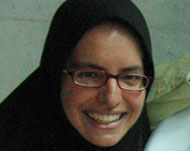Western peace activists freed in Iraq
Three Western peace activists held hostage in Iraq for four months have been freed in a British-led operation, two weeks after one of their colleagues was slain by their captors.

Canadians Harmeet Sooden, 32, and Jim Loney, 41, and Briton Norman Kember, 74, from the Christian Peacemaker Teams, were rescued in a joint US-British operation in a rural area northwest of Baghdad on Thursday, the Iraqi interior ministry said.
US military spokesman, Major-General Rick Lynch, said the captors were not present at the time of the operation.
“They (the hostages) were bound. There were no kidnappers in the area.”
The operation was based on information provided by a detainee and took place at about 8am (0500 GMT) on Thursday, he added.
No shots fired
Speaking in Toronto, Doug Pritchard, co-director of the Christian Peacemakers Teams, said no shots were fired in the operation.
Kember, reportedly in “reasonable condition” and recovering in Baghdad‘s top-security Green Zone where the British and US embassies and the Iraqi government are based, said on Thursday: “It’s great to be free.”
 |
|
Tom Fox’s body was found in a |
But the two Canadians needed hospital treatment, Jack Straw, the British foreign secretary, said.
The three men were seized in Baghdad on 26 November with US colleague Tom Fox, who was executed by his captors earlier this month.
Their abduction was claimed by a group calling itself the Brigades of the Swords of Righteousness which threatened to kill them unless all Iraqi prisoners were released.
The three freed hostages last appeared in a video broadcast on Aljazeera on 7 March in which they issued a new appeal for their governments to work for their release.
Fox was found handcuffed and shot dead on a rubbish dump in west Baghdad on 9 March. His body had been wrapped in a blanket and stuffed in a plastic bag.
Occupation blamed
Pritchard, of the Christian Peacemakers Teams, said: “Our gladness today is bittersweet by the fact that Tom is not alive to join his colleagues in the celebration.”
He said the former hostages “knew that their only protection was in the power of the love of God and of their Iraqi and international co-workers”, and blamed the chaos in the country on the presence of foreign troops.
“We believe that the illegal occupation of Iraq by multinational forces is the root cause of the insecurity which led to this kidnapping and so much pain and suffering in Iraq today,” he said. “The occupation must end.”
Other hostages
At least 430 foreigners are known to have been taken hostage in Iraq since the March 2003 US-led invasion, a US diplomat said in Baghdad earlier this month.
They include 41 US nationals, some of them Iraqi-Americans.
Seven are still being held, including Jill Caroll, a 28-year-old American journalist who was on assignment for the Christian Science Monitor when she was abducted on 7 January.
She has since appeared in three videos broadcast on Arab television. The latest deadline set by her captors passed in late February with no word on her fate.
 |
|
Jill Caroll, an American journalist, |
At the end of February, Zalmay Khalilzad, the US ambassador to Iraq, said that the Iraqi authorities knew who the abductors were and that she was alive.
Earlier this week, a German television station said that the government in Berlin believed that two German engineers kidnapped in Iraq in January were still alive and were being held for criminal not political purposes.
Rene Braeunlich and Thomas Nitzschke were seized in northern Iraq on 24 January and their captors have issued two videos in which they threatened to execute the men unless Germany closes its embassy in Baghdad and ends cooperation with the Iraq government.
Another Briton, Ken Bigley, was beheaded in October 2004 by a group led by Abu Musab al-Zarqawi, the Jordanian-born leader of al-Qaida in Iraq and the country’s most wanted man with a $25 million bounty on his head.